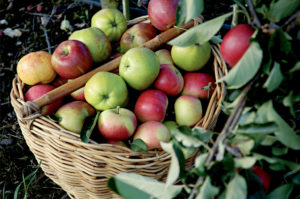

| Visitors Now: | |
| Total Visits: | |
| Total Stories: |

| Story Views | |
| Now: | |
| Last Hour: | |
| Last 24 Hours: | |
| Total: | |
More Home Apple Growers Consider Going Organic
The Telegraph (GA)
By Dean Fosdick — For the Associated Press

An apple a day keeps the doctor away, but maybe less so if you spray. That’s why organic fruit management is becoming more common in commercial and home orchards, industry analysts say.
“The problem with using chemicals to fix problems is that the chemicals might provide a short-term solution but they actually create long-term problems,” said Jeff Dinslage, president of Nature Hills Nursery in Omaha, Neb., the largest online seller of trees in the country. “More and more of our customers simply don’t want to use chemicals in their backyards that could harm their children, their pets and themselves.”
Organic produce is enriched through the use of organic matter and cover crops. No chemical pesticides, fungicides or fertilizer are applied.
Much commercially grown produce has chemical residues on it, even if you wash it, said Sonya Lunder, a senior analyst for the Environmental Working Group, a Washington-based non-profit that examines toxins in foods. With apples, for instance, “there are a lots of pesticides and fungicides involved in their growth and storage,” she said. “When looking at residue data, apples usually top the list. Be versatile in what you eat and where you shop.”
Although U.S. apple production has declined in recent years, consumer demand has spurred a fast-growing organic apple industry, the U.S. Department of Agriculture says. Apples managed under organic farming systems now account for 6 percent of total U.S. apple acreage.
Gregory Peck, a horticulture professor at Virginia Tech, noted that “there are probably a dozen or so diseases that attack apples, and 60 or so insects.”
If you must spray, Peck said, do it responsibly.
“Ask yourself if the problem is causing enough injury that you have to protect it,” Peck said. “Time it properly. Spray when you’re going to target the pests. Choose materials that will control the problem, but won’t be detrimental to beneficial insects or water quality.”
If you opt to go organic, start with the right plant in the right place, he said. Hardier varieties generally perform better than others under organic management. With apples, that would include the Liberty, Enterprise and Gold Rush varieties, he said.
“For fruit production, also choose the most disease-resistant varieties you can,” he said. “Look at natives that have proven reliable in your area.”
Bob Sewall, owner of Sewall Organic Orchard in Lincolnville, Maine, says successful organic farming begins with the soil.
“A healthy soil makes for a healthy plant,” he said. “That’s the basis of organic management. I spent two years preparing the soils in our orchard.”
Organic growers must be vigilant about spotting small problems before they become big ones, Dinslage said.
“You might also have to tolerate a less than photographically perfect apple,” he said. “But the benefits of treating a healthy environment for all living things more than outweigh the slight hassles involved with organic growing.”
The post More Home Apple Growers Consider Going Organic appeared first on Cornucopia Institute.
2013-04-30 16:05:06
Source:


